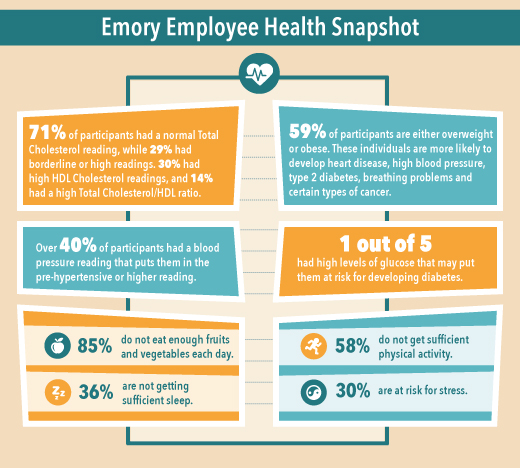UPDATE: 1/7 - Emory again this year offers free, onsite biometric screenings to all employees, spouses and partners, and retirees from Jan. 13 through Feb. 28.
The screenings provide a simple health check to measure blood pressure, cholesterol, glucose and BMI (body mass index). Employees who participate in the screening and complete an online health assessment can earn an incentive through their Emory medical plan.
Screenings are available at over 80 locations; those interested can register online.
-----
Making healthy choices for faculty, staff and students is the goal of an initiative now under way at Emory. What began as a leadership development project has now emerged into a formal, enterprise-wide effort for culture change: a vision for a Healthy Emory.
The origins of the Healthy Emory initiative can be traced back to a 2008 leadership project as part of Emory Healthcare's Woodruff Leadership Academy. More recently, in early 2013, Emory University's Excellence Through Leadership program explored the concept further, addressing the question: how can Emory, as an employer, educator and health care institution, advance the health and wellness of its own faculty, staff and students? Reports and recommendations from both leadership groups now serve as a starting point for a larger effort: to draft a strategic plan that will help Emory weave health and wellness into the very fabric of the Emory community.
"These leadership groups have laid the foundation," says Michael Staufacker, director of health management. "The next phase is to build upon what they've started and develop a comprehensive strategic plan to engage our faculty, staff and students in the pursuit of a healthy lifestyle."
Taking Healthy Emory from concept to the next level is the Healthy Emory Steering Committee. Made up of members from the University, Emory Healthcare, and the student body, the newly-formed committee will meet over the next six months to analyze data, conduct a review of existing health resources, and develop a strategic plan to move Emory forward in the area of health and wellness. An Executive Committee, chaired by Linda McCauley, dean of the School of Nursing, will provide oversight and guidance to the steering committee and help ensure that Emory's leadership is committed to supporting the goals of Healthy Emory.
Wright Caughman, executive vice president for health affairs, kicked off the first meetings of both committees in November. He says, "Through the Healthy Emory initiative, we have a unique opportunity to leverage our status as a nationally recognized leader in health promotion and education, disease prevention, and public health policy to engage the entire Emory community in achieving better health for all."
The steering committee will examine data collected from a variety of sources to help identify priorities. One important source is the 2013 employee biometric screenings and online health assessments. More than 3,700 university employees participated in free onsite biometric screenings that measured cholesterol, blood pressure, glucose and body mass index (BMI). More than 3,000 university employees also completed the online health risk assessment, a detailed questionnaire of health-related behaviors. ] Data, which is anonymous, from both of these activities provides an important view of Emory's employee health status: nearly one-third deal with issues relating to stress, more than half are overweight or obese, 85 percent don't eat enough fruits and vegetables, and over one-third don't get a sufficient amount of sleep. The chart below summarizes key findings:

Graphic by Erica R. Ervin
"Data collected from the screenings and health assessments helps to demonstrate some of the health risk behaviors the strategic plan should address," explains Staufacker. "We know from many years of research that unhealthy behaviors have negative impacts on both employees and on Emory. These data will also serve as a baseline, so as we begin to work toward building a culture of health here at Emory and making enhancements to our programs, we will have something to measure against."
Staufacker says that the strategic plan will also address how to effectively leverage Emory's existing health resources to enable Emory's faculty, staff and students to take full advantage of them. "Emory offers an abundance of resources including a world-class health care system, ample recreational facilities, and health and wellness programs like walking groups, nutritional counseling, disease management and health coaching," he explains. "The committee will not only use these as part of the plan, but will also identify gaps and make recommendations for new programs and services that will improve the health of the Emory community."
A logo to promote Healthy Emory as a brand has been developed and now appears in various health and wellness communications. This includes the recently painted indoor walkways underneath Emory Healthcare, to encourage walking there.
"Building a culture of health and wellness is not an easy or quick task," explains Staufacker, "but we have all the components for success — leadership support, a steering committee to guide us forward, and a strong communications brand. Our vision for a Healthy Emory is moving forward, and all who are involved are excited by the prospect of ensuring that health and well-being are core objectives here at Emory."
